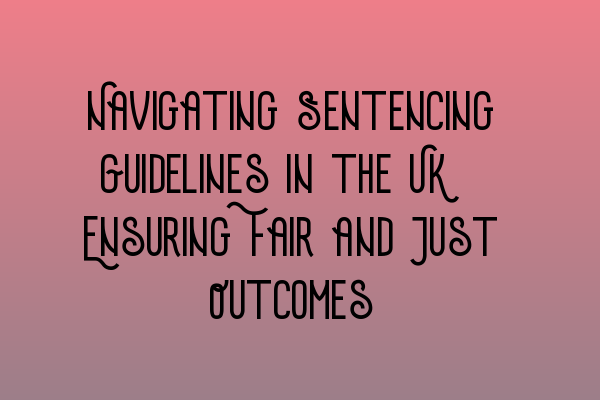Navigating Sentencing Guidelines in the UK: Ensuring Fair and Just Outcomes
Introduction
When it comes to criminal law in the UK, navigating sentencing guidelines plays a crucial role in ensuring fair and just outcomes. The Sentencing Council has established guidelines that help judges and magistrates determine appropriate sentences for various offenses. These guidelines take into account factors such as the seriousness of the offense, the offender’s culpability, and any aggravating or mitigating factors.
Understanding Sentencing Guidelines
Sentencing guidelines provide a framework for consistent decision-making by judges and magistrates. They aim to promote transparency and predictability in the sentencing process while maintaining judicial discretion. By considering the relevant factors and following the guidelines, the courts can achieve fair and proportionate sentencing.
However, understanding sentencing guidelines can be a complex task. It requires a deep knowledge of the law, legal precedents, and the specific circumstances surrounding an offense. This is where the expertise of a qualified solicitor specializing in criminal law becomes invaluable.
The Role of a Solicitor
In cases involving potential criminal charges, consulting a solicitor with expertise in criminal law can significantly impact the outcome. A solicitor can provide expert advice, guide defendants through the legal process, and represent their interests during sentencing hearings. They can ensure that all relevant facts and circumstances are presented to the court, advocating for a fair and just outcome.
For individuals preparing for a career in criminal law, obtaining qualifications like the SQE (Solicitors Qualifying Examination) can provide a solid foundation. Courses specific to SQE 1 and SQE 2 preparation are available to help aspiring solicitors gain the necessary knowledge and skills to navigate sentencing guidelines effectively.
SQE 1 preparation courses and SQE 2 preparation courses can equip individuals with the legal knowledge and analytical abilities required to understand and apply sentencing guidelines accurately.
Ensuring Fair and Just Outcomes
The overarching goal of sentencing guidelines is to ensure fair and just outcomes in criminal cases. They seek to strike a balance between punishment, deterrence, protection of the public, and the rehabilitation of offenders. By considering the relevant factors, judges and magistrates can tailor sentences that are proportionate to the seriousness of the offense and the circumstances of the offender.
It is crucial to note that each case is unique, and sentencing guidelines are flexible enough to allow for individual circumstances to be taken into account. Factors such as the offender’s age, previous convictions, remorse, and personal circumstances can all influence the final sentence.
The Importance of Staying Informed
To effectively navigate sentencing guidelines, it is essential for legal professionals to stay informed about any updates or changes to the guidelines. The Sentencing Council regularly reviews and updates its guidelines to ensure they remain relevant and reflective of societal expectations.
As an aspiring solicitor or existing legal professional, staying updated and engaging in continuous professional development is vital. This is especially true for those pursuing a career in criminal law, where knowledge of current sentencing guidelines is crucial. Regularly attending relevant seminars, workshops, and SRA SQE exam dates can help you stay up-to-date with any changes and developments in the field.
Conclusion
Navigating sentencing guidelines in the UK is a complex but essential aspect of ensuring fair and just outcomes in criminal cases. By understanding and applying these guidelines effectively, legal professionals can advocate for their clients and contribute to a more equitable justice system.
If you’re interested in enhancing your knowledge and understanding of criminal law or seeking SQE qualifications, consider exploring SQE 1 Practice Exam Questions or SQE 1 Practice Mocks FLK1 FLK2 to test your skills and readiness.
